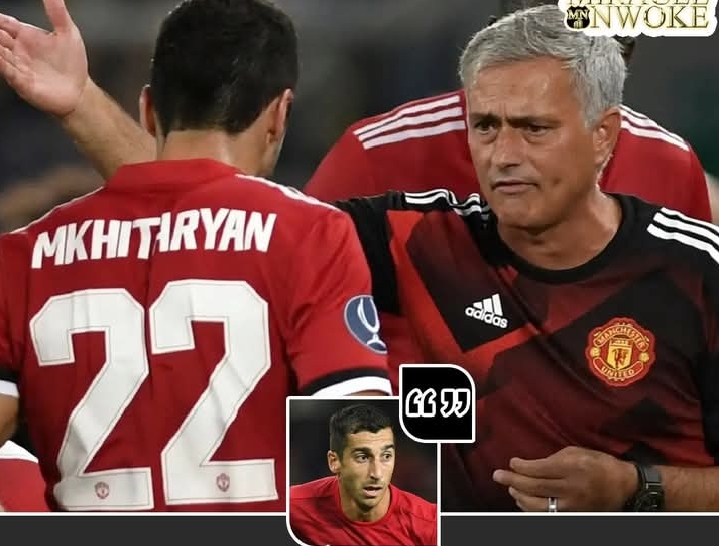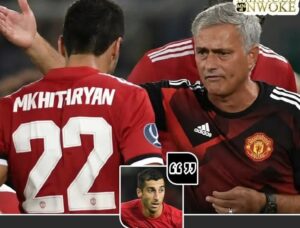“Henrikh Mkhitaryan Claims He Referred to José Mourinho as ‘a Piece of Trash’ Over His Treatment While at Manchester United”
A Turbulent Relationship: Mkhitaryan vs. Mourinho at Old Trafford
Henrikh Mkhitaryan’s time at Manchester United was marked by flashes of brilliance but overshadowed by a fraught relationship with manager José Mourinho. The Armenian midfielder has since revealed deep frustration with how Mourinho treated him, saying he finally lost his patience after months of harsh criticism, silence, and what he felt was disrespect. The following is a detailed look at how things unfolded, what Mkhitaryan has alleged, how Mourinho responded, and what this says about player‑manager relationships at clubs with intense expectations like United.
—
Arrival, Expectations, and Early Struggles
Mkhitaryan joined Manchester United in 2016 from Borussia Dortmund. He was seen as a creative and technically gifted player who could add flair, control, and attacking threat. But transitioning to the Premier League and adapting to Mourinho’s expectations proved difficult. Early on, Mkhitaryan was dropped, substituted at half‑time, and criticized for his performances and perceived inconsistency.
Mourinho, known for demanding high levels of discipline, intensity, and defensive responsibility as much as attacking output, often demanded more from players than fans might see. For Mkhitaryan, the adaptation was not instant. He was not always in the starting XI, and when he was, he sometimes felt under pressure to conform quickly to a system with little margin for error.
—
The Criticism, Silence, and Mounting Frustration
Over time, Mkhitaryan has described the treatment he felt he was receiving from Mourinho as becoming unbearable. According to recent accounts, Mourinho was not only publicly critical but also used very harsh language in private. Mkhitaryan claims there were periods of near‑silence from the manager: in training sessions Mourinho would barely speak to him, refusing to offer support or feedback. Meanwhile, criticism continued, and Mkhitaryan says he was being blamed for underperforming even when effort and results didn’t always justify such treatment.
In one of the most striking claims, Mkhitaryan reports that he told Mourinho something along the lines of “you’ve been criticizing me for a year and a half now … you are shit,” in response to what he saw as relentless verbal attacks. Mourinho allegedly then replied with, “Get out of here, I never want to see you again.” To compound this, Mkhitaryan says the manager would send daily messages asking him to leave the club so Mourinho could bring in Alexis Sánchez.
—
Mourinho’s View, Apologies, and Public Statements
Mourinho’s public statements during Mkhitaryan’s time at United show a complex picture. On more than one occasion, Mourinho referred to Mkhitaryan’s adaptation to the league as taking longer than expected, questioning consistency in performances.
However, there were instances where Mourinho acknowledged he may have been unfair. One notable example: after substituting Mkhitaryan at half‑time in a FA Cup match, Mourinho publicly apologized, saying that the midfielder didn’t deserve to be taken off when he was contributing positively to the game.
Despite these moments of concession, the overall narrative from Mkhitaryan is one of emotional strain and feeling undervalued under Mourinho’s stewardship.
—
The Climax: Departure and Aftermath
By January 2018, the relationship appeared irreparable. Mkhitaryan moved to Arsenal in a swap deal for Alexis Sánchez. The transfer followed mounting evidence of discord, dissatisfaction, and what Mkhitaryan describes as psychological pressure. He has said he “lost his patience” with Mourinho after repeated criticism and what he believed was continuous disrespect.
After the move, his national team coach and commentators reflected that the style of play and environment at Arsenal may suit him better than what he experienced under Mourinho. They suggested a less intense, more supportive setting might allow him to “play better football.”
Mkhitaryan has also outwardly acknowledged that despite the difficulties, there were positives: that dealing with adversity made him mentally tougher. He has looked back at his United years as mixed—not all bad, but certainly challenging.
—
What This Reveals: Management, Communication, and Player Welfare
1. Communication is Key
One of the central issues here was how Mourinho communicated (or didn’t). Criticism alone isn’t unusual at top clubs, but when feedback is unbalanced by support, encouragement, or clarity, it can lead to frustration, confusion, and loss of confidence.
2. Respect and Psychological Safety
Players need to feel that they are respected, even during criticism. When a player claims that the manager “never wants to see” him again, that crosses into personal territory, not just performance management.
3. Expectations vs. Reality
Mourinho’s expectations at Manchester United were high. For Mkhitaryan, being known as an excellent player pre‑United meant that expectations were especially steep. However, adjusting to a new league, new style, and team culture takes time. When patience is limited, and errors are met harshly, it can damage performance rather than improve it.
4. The Role of Apologies and Reconciliation
Mourinho apologised at least once for removing Mkhitaryan at half‑time when the manager felt that was unfair. This shows that even in high‑pressure environments, acknowledgement of mistakes matters. But isolated apologies may not be enough if the overall treatment remains negative.
5. Legacy: Talent, Trophies, and What Remains Unsatisfied
Though Mkhitaryan won trophies with United (including the Europa League), many feel the full potential of his time there was never realized. The tension with Mourinho is a large part of why. The tangible success (trophies) is balanced by intangible costs: mental strain, public criticism, uncertainty, lack of trust.
—
Conclusion
Henrikh Mkhitaryan’s allegations against José Mourinho cast a harsh light on the pressures at elite clubs like Manchester United. What he describes is not just managerial criticism, which is part of football, but something that he felt became personal, persistent, and damaging. For Mkhitaryan, the layers of disrespect, isolating behaviour, constant criticism, and lack of communication pushed him to a breaking point.
This case underscores how important it is for managers not just to demand excellence, but to treat players as individuals. Footballers are talented, yes, but also human—and how they are managed can influence not just their performance but also their self‑belief and mental health. The United‑Mkhitaryan‑Mourinho chapter is a reminder that success in football isn’t only about wins and trophies; it’s also about relationship, trust, and respect.












Leave a Reply